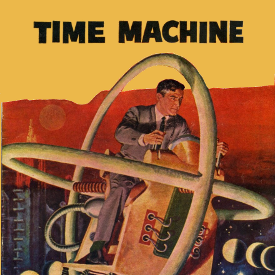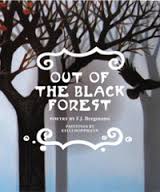Chain Mail is a telephone tag by email round-robin interview session with authors from the Book View Cafe writers collective. Images are links, connecting to biographical information about an author or more information on their current work. Additional information can be found on the contributors page.
Amazing Stories: IS SCIENCE FICTION DYING?

Deborah J. Ross
I read this question in three different ways.
One, have we run out of sfnal ideas and writers to turn them into stories?
Two, is it so unprofitable to publish sf that the genre is headed for extinction?
Three, are readers no longer interested in sf? Here is my own very brief answer to the first.
We have not run out of ideas, enthusiasm, or writers. In its history, science fiction received two enormous boosts. The first came at the end of the 19th Century, with the Victorian era explosion of technology and scientific discovery. This was the era that gave us Jules Verne and H. G. Wells, and the next generations of writers. It also continues to generate tales of mechanical genius, romance, and adventure through the current steampunk genre, which hearkens back to the time when technology was understandable by the ordinary person.
The second boost came with the space race of the mid-20th Century and the focus on science education, plus the coupling of astronomy, post World War II pyrotechnics, and old-fashioned derring-do. Then came a period of disenchantment with technology and with science itself; when invention created more problems than it solved, the future no longer looked so shiny. I hope the pendulum has begun to swing the other way now. Although the frenzied pace of manned space exploration has moderated, today’s crop of space telescopes (Hubble, Chandra, Kepler, and others) bring us the universe as we have never before seen it, so I hope there will be no lack of inspiration in astronomy, biology, chemistry, geology, oceanography, computers… and therefore, no dearth of great science fiction story ideas.
![]()

Katharine Eliska Kimbriel
Many thanks for a concise intro, Deborah!
Taking up your breakdown of three parts to this question, I must agree that we have not run out of ideas, interest or writers to take up the banner of SF.
SF has two forms, really — Buck Rogers and Frankenstein. We are still in a period of “Gee Wow!” SF, where the majority of readers and viewers of SF want breathtaking entertainment and joyful escapism. But this does not mean that there isn’t a large audience for thoughtful, probing questions about everything from social engineering to a future controlled by corporations. For every Star Wars, there is a District 9.
The books and movies that survive time generally have more than special effects to recommend them.
I do think that some of the Golden Age writers are correct when they say that SF has won the battle of acceptance — in fact, it may be the most popular form of mass entertainment today. But the form that stands out is in visual content — movies, games, television — while the seeds of these forms are found under many subheadings of written SF. Some of those labels are not even called SF.
The other major aspect of SF — If this goes on — is currently a smaller piece of the SF pie. But it’s still there. A lot of things in the world are downright terrifying to contemplate, and many people don’t want to face those issues head on. But those questioning books will be read and digested by many folk. Some of those readers will write broader-based tales that convey important ideas to a larger audience, and others will go out and begin chipping away at the those problems.
I think that is part of SF’s universal appeal — you have a problem. How will humans solve that problem? Their curiosity and ability to survive in extreme situations is what makes SF such a malleable platform. SF is big bucks, for Hollywood and for publishing. It lives!
 Phyllis Irene Radford
Phyllis Irene Radford
In recent years some ultra conservatives have given science a bad name. Scientific fact has to be wrong if it contradicts faith based interpretation. So, Science Fiction has gone semi-underground and is now masquerading as thrillers that routinely hit the best-seller lists.
The sensawonder, the awe, the “what if” factor that gets you thinking of alternatives is still there. Projecting a scenario forward to demonstrate consequences is still an important storytelling tool. The projection may be as simple as the consequences of extended home-schooling by parents who can barely read themselves, or as complicated as the genetic modification of tomatoes, or gene therapy spiraling out of control. The story may be character driven space opera that retells old morality plays in a fun setting.
It is a part of us and will remain no matter what disguise we put on it.
This denial fad will pass and something else will become the forbidden genre. Then Science Fiction will surge forward with new ideas, new what ifs, and new sensawonder.
![]()
 Vonda N. McIntyre
Vonda N. McIntyre
Every genre goes through booms and busts. I think SF will always be around, even if sometimes it masquerades as not-SF, or if the author engages in (understandable, alas) the marketing technique of claiming their clearly SF work isn’t SF at all, at all.
I look on SF as, among other things, a way to explore what might be, what might happen, how changes in culture, science, technology might affect people. I don’t pretend to predict, though when one’s ideas occur in the real world, it’s amusing. But I do speculate, and SF gives me a much wider field for speculation than realistic fiction ever could.
 Judith Tarr
Judith Tarr
Depends on what you mean when you say “SF.” Rockets and robots? Mostly outdated, along with computers the size of railroad cars (that weren’t nearly as powerful as the cell phone in your pocket). Space opera? It comes and goes.
My agent says it’s mostly moribund on Publishers’ Row, but my readers and colleagues still love and want more of it. Speculative fiction in its full range, from alternate history to the Singularity? Alive, well, and kicking in film, on television, and in the written word.
I think the new publishing landscape may be good for SF. There’s room for the smaller work and the edgier idea, as well as for the big sprawling epic like Smith and Trowbridge’s Exordium series.
 Pati Nagle
Pati Nagle
Yes, there’s a disconnect between what Publishers’ Row is buying and what readers want. This is where independent publishing is filling a gap, resulting in many happy readers.
I agree that SF books are currently on a down trend, especially in New York publishing land, but they won’t go away. There are readers who want SF, and there always will be.
 Dave Trowbridge
Dave Trowbridge
Fortunately, thanks to ebooks, there’s a growing disconnect between what Publisher’s Row thinks will sell and what’s actually for sale out there. So no, SF is not dying, it’s only resting. The phoenix will take flight again!
 Sue Lange
Sue Lange
As long as there are science fiction writers writing science fiction, there will be science fiction. I don’t know about everybody else, but BVC is holding up its end of the sfnal world.
I agree with Dave and Judith that new publishing models give opportunities to any writer that feels marginalized, but I don’t think the sf writer is marginalized. I think writing science fiction is maybe more difficult now than before. It’s not that we’re running out of ideas, it’s just that we’re living in a science fictional world now. The predictions of the past are here. We’re seeing how yesterday’s Gee Whiz development is really pretty boring. And if you imagine something today, chances are, by the time your book comes out, your invention is going to be here and not very eye-popping. It becomes harder to amaze people with simple extrapolations. Everybody’s extrapolating nowadays.
To amaze people now requires science that few people “get.” Deborah touched on the fact that the first blush of sf popularity used science that ordinary people could understand. Some of the best sf today is inscrutable to non-scientists. And inscrutable even to scientists for that matter. Science is so fractured, it is no longer possible to be an expert in all areas.
Science fiction is not dead, not dying, but it is changing, evolving into two types: escapism for the masses, and the thoughtful, issues-oriented type of sf fiction for the philosophers. Come to think of it, there has always been that dichotomy. We remember the issues-oriented pieces of classic sf, but the escape literature of the day we probably no longer remember. I imagine that’s true of every genre.
 Linda Nagata
Linda Nagata
I’ve been hearing that SF is dying almost since I started writing it. But you know what? SF is still around, and being published in decent quantity from what I can see. I’ve recently waded back into the short story market place and I’m amazed and impressed at all the publications interested in science fiction.
 Jennifer Stevenson
Jennifer Stevenson
Science fiction is commercial fiction. It serves the public of its day, just as romance and fantasy and mysteries and thrillers and westerns serve. Commercial fiction echoes the emotions and answers the questions of the public that buys it.
The science fiction of the past—the canon, the “classic” genre, “the pure product”—served the public of its day.
New science fiction responds to the emotions and questions of the current commercial-fiction-buying public … or it doesn’t get bought.
A fan or writer of science fiction who wonders “where did science fiction go?” might find out by asking themselves, “what questions does my favorite science fiction answer for me, what emotions does it echo for me?” We do not necessarily dwell emotionally in “the present.” “The present” is a different decade, even a different century, depending on where in the world one lives, one’s personal “golden age,” and how involved one is with that version of “the present” where dwell those who write and publish books.
Steampunk doesn’t just show us technology we can understand. It returns us to an era when we still stood at social, political, technological, economic, even psychological crossroads we cannot now revisit; technology was entirely hopeful. I leave you to examine that proposition and draw your own conclusions.
Someone who wants to “revive science fiction” should look hard at themselves, at their emotions, and what large questions they long to answer. Chances are they’re not alone with those emotions and questions. That’s where new and successful science fiction comes from.
 Maya Kaathryn Bohnhoff
Maya Kaathryn Bohnhoff
Robert Heinlein famously said that SF wasn’t about technology but how people react to it. When I combine this with Ray Bradbury’s idea that SF is about solving today’s problems by setting them in the future, I can come to no other conclusion than that science fiction will be with us until the end that hath no end.
We will always need to solve problems—even when we’re like the Organians of Star Trek fame. That is, beings of pure spiritual energy. If nothing else, we will need to deal with those prepubescent still physical species who arrive on our world(s) assuming that they’re all grown up just ‘cos their hormones are running amok.
As a market commodity SF, like every other genre, has ups and downs that depend in great part on what real life problems we’re facing. I think SF probably booms when things in what we laughing call “real life” get a bit too real. Which is not to say that SF is escapist, but I think what it does do is give us new ways of thinking about old problems.
I have this marvelous device called an iPad that I swear I first saw on Star Trek: Next Gen in the hands of Dr. Crusher. Now my real life doctors have them. And that’s just the technology.
I think, also, that the type of SF we read and watch and hunger for depend on what we need to hear. Some SF offers sober assessments of where trends in society might land us (Soylent Green is People!), some assures us that there really is hope for a brighter future (Childhood’s End) and some just says, Gosh, wow, isn’t this COOL!
Like I said, as long as we have problems that need solving, we’ll have science fiction.
 Chris Dolley
Chris Dolley
What more can I add? It’s not dead. It’s not dying, and it’s not living under an assumed name in the Genre Protection Program.
 Brenda Clough
Brenda Clough
Yes. And the way that SF dominates TV and movies is in our favor. They’ll always be coming back to the books, to mine for ideas, titles, and themes. (Hey, Stephen Speilberg! I’m over here — just Google me!) And the viewers of those shows and films will be coming back to the books, for more.
Thanks to everyone who participated! Coming July 5th:










